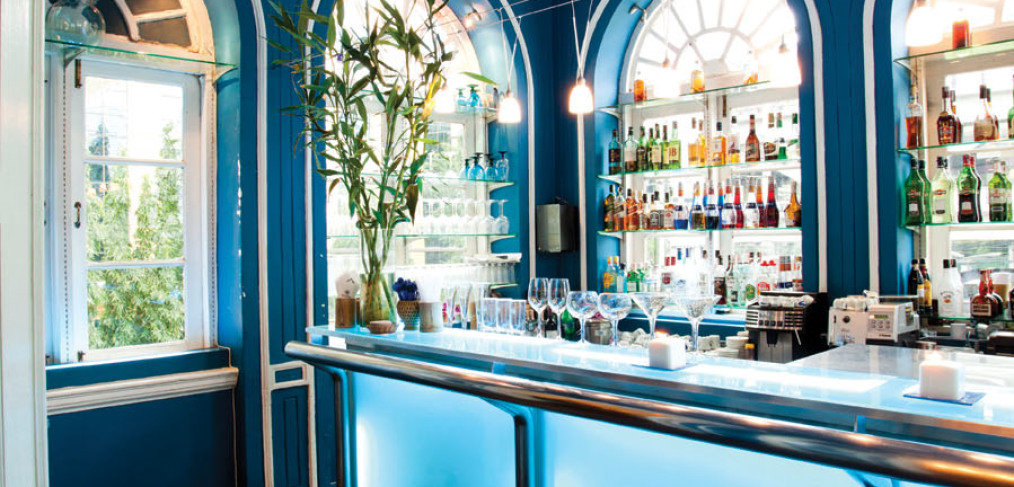
On The Table: Blue Elephant
 Mark Bibby Jackson visits Bangkok’s Blue Elephant restaurant to chat with its founder Nooror Somany Steppe about the main passion in her life — Thai food.
Mark Bibby Jackson visits Bangkok’s Blue Elephant restaurant to chat with its founder Nooror Somany Steppe about the main passion in her life — Thai food.
It’s a lucky journalist who gets to sit down with Nooror Somany Steppe in the Bangkok branch of her Blue Elephant restaurant chain. Today, I am even luckier, as the famous chef has time to join me for lunch.
The founder of the brand that has become synonymous around the world with the best of Thai cuisine has just returned from a food trip to South Africa, and is set to fly to South Korea to lecture at a university courtesy of the Korean government tonight. Yet she still has time to give me her views on why Thai cuisine has become such a global phenomenon in recent years.
“In the old days, nobody knew that Thai cuisine was wonderful,” she says, pointing out that there are now more than 6,000 Thai restaurants in the US alone.
According to Nooror, much of the credit must go to the successive Thai governments that have actively promoted the country’s cuisine for the past 15 years.
For instance, the government-supported THAIFEX has become one of Asia’s most important food fairs, attracting almost 30,000 visitors from more than 125 countries each year. Other government promotions include her recent DITP-funded visit to South Africa.
Recently selected as one of the top ten Thai chefs by DITP, Nooror opened the first Blue Elephant not in Bangkok, but Brussels in 1980. Now there are 12 branches globally, including restaurants in London, Copenhagen, Paris, Dubai, Moscow and Jakarta. Indeed, you can detect a cosmopolitan influence in her dishes, with the massaman curry made with imported Australian lamb rather than local beef.
“Thai food must not die,” she explains. “You have to improvise.” Consequently the Blue Elephant menu has a section devoted to the Thai Cuisine of Today alongside more traditional segments such as Thai Cooking of the Past and Royal Thai Symphony, which includes Royal Thai dishes.
Not that there is much improvisation in Nooror’s kitchen this lunchtime. During our meal she rushes out between courses to ensure that the food is prepared to perfection, making the paste for the southern-style crab curry herself to guarantee the right degree of chilli to unleash on our palates.
The outcome is devastatingly good and I feel even more privileged to be eating here. After all it is not everyday you are cooked for by a Thai master chef. The dish is served alongside a black chicken curry in coconut milk presented in the coconut shell, a king prawn salad with avocado, and the lamb massaman curry, which fully justifies her choice of imported meat. Like in all good Thai food, there is just enough spice, but mixed in with other more subtle flavours and herbs.
Nooror believes that Thai food benefits from its geographical location. “Thai cuisine picks up the best part of the neighbouring cuisines,” she explains to me over dessert — a chocolate mousse imported from Belgium that only suffers in comparison with my mother’s. “The wok is from China, the curry sauce from Malaysia and the salad from Laos,” she says.
However, what gives Thai food its distinctive flavour is the combination of six, not five, tastes: herb, spice, sweet, sour, salt and cream. Many of the herbs that are used at the Blue Elephant are from the Royal Projects programme, established to grow fresh produce, that she is keen to promote. This also allows her to use herbs, such as rosemary, that you would not usually find in a Thai kitchen.
While French cuisine might crudely be claimed to be all about the sauce, Thai cuisine is much more about the quality of the ingredients used and what Nooror, betraying her Belgian influence, refers to as the “mise en place” — the cutting and preparing of food.
Her cuisine has become such as global success that she now exports her own cooking packs and sauces under the Blue Spice label, for which she was recently presented with a Thai Select Award by the Prime Minister Yingluck Shinawatra. It’s been a long journey for the daughter of a halal beef trader and curry paste maker born in Chachoengsao province, but one that looks set to continue.
Our lunch over, Nooror recalls how much I complemented the crab curry and hands me a package of her curry paste. I wonder just how much it has changed from the versions her mother used to mix. There’s just enough time for one more question.
“My favourite dish is nam prik pla too,” she answers, referring to the traditional spicy dip that you can find all over the country. “Although I love to eat French fries and mayonnaise.” After all, even the world’s best chefs need their occasional comfort food.
Blue Elephant (Blueelephant.com) is one of the Thai restaurants endorsed by the DITP under its Thai Select scheme as being authentically Thai. For more details of the scheme visit: Thaiselect.com.
